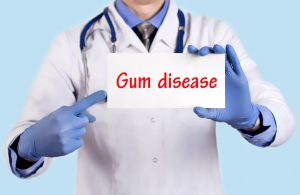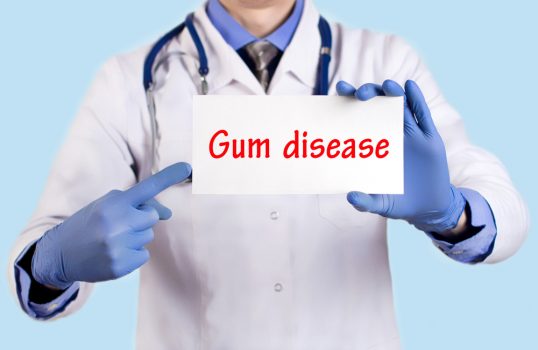Remember how our parents used to coax us into brushing our teeth daily, as kids? They threatened us with our teeth rotting and falling off. We dismissed it to be a story when we grew up, but, guess what? It is true! Well, at least partially correct. Poor oral hygiene can lead to Periodontitis.
What Is It?
Periodontitis is the inflammation of the gum tissues due to bacterial infection. If left unchecked, it can spread below the gums to the roots of the teeth and cause massive destruction of the bone and periodontal ligament.
This inflammation is the body’s reaction to the increase in the layer of bacteria present on the periodontal surface and the trapped food debris that form a segment known as plaque. When the plaque content increases, it hardens to become tartar, and the inflammation becomes chronic resulting in Periodontitis.

Causes
- Poor oral hygiene
- When the plaque hardens to tartar, the resulting chronic inflammation leads to Periodontitis
- Patients are having a previous case-history of gingivitis
- There are about 700 different colony cultures of bacteria in our mouth. It causing an infection depends upon how virulent the bacterial strain is and how weak the individual’s immune system is
- Intake of various anti-hypertensive drugs, vasodilators, immunotherapeutic, etc. can affect the inflammation process making the person susceptible to gingivitis
- Smoking can increase the risk of bleeding gums being masked. It can also make the person reject a tooth implant. These factors can lead to chronic inflammation which in turn results in Periodontitis
Symptoms
- Gingivitis can lead to bleeding gums which can further lead to Periodontitis
- The bleeding can increase due to vigorous brushing, due to food debris or sometimes can occur spontaneously
- Halitosis (bad breath)
- Lengthening of teeth
- Change in teeth position
- Pain
- Painful abscesses can occur while eating
- Periodontitis is a risk factor in pregnancy and can cause preeclampsia, premature birth, the low birth weight of the fetus, etc.
Prevention
- If we ensure there are no plaque deposits, then there will not be any infection
- Clean the chewing surface of the teeth at least twice a day
- It is essential to clean the space in between the teeth by flossing or using interdental brushes in case of crowded or crooked teeth
- Using antibacterial mouthwash after each meal
- Regular periodontal visits for professional cleaning of teeth to remove the tartar deposits
Treatment
- Proper oral hygiene is essential to prevent and treat Periodontitis. The patient must floss in between the teeth to keeps the gums healthy and free from food debris that can potentially pose a danger and cause chronic inflammation.
- Professional cleaning must be undertaken. The debris is removed using a particular instrument from the gingival pockets, the chewing surface of the teeth, the roots, etc.; and the teeth are cleaned using fluoride and specific cup-like structures; this keeps the teeth healthy, and the polished surface makes it harder for the bacterial colonies to proliferate.
- Antibody therapy is given to eradicate the microbial population.
- Reassessment must be carried out after several weeks following a procedure to ensure that proper oral hygiene is being maintained and there is no new development of plaque or tartar. A periodontal probe is used to measure the depth of the depth of the gingival pockets to check for bleeders.
- Surgical procedures can be followed. The surgery entails the lifting of the gums to clean the roots of the teeth. This process is carried out under local anesthesia. It is done to surgically remove all the microbial colonies, plaque debris, etc.; and it is also done to treat bone loss with a particular regenerative process. The gum is then sutured back into position.
- Patients must keep regular appointments to get their ‘after-care treatment’ done.
Important Article: Boost Your Confidence with Cosmetic Dentistry Measures
Dr. Tyson, an expert Huntsville Dentist, sees many cases of Periodontitis per day for treatment and consultations. He says that many of these problems could have been avoided if the patient had maintained proper oral hygiene. If not, they should visit dentists at earlier stages of the disease for simple treatment. Thus, it is essential to get over our fear of the dentist and put our care first.
Smile, and display those healthy, pearly-whites!

